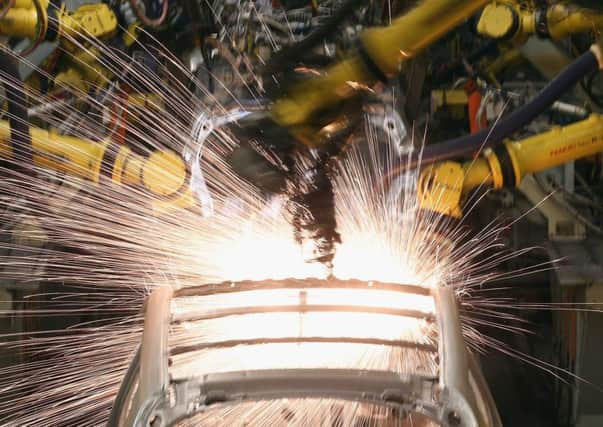Two-thirds of UK jobs at risk from '˜rise of the machine'


A far-reaching report by the Institute for Public Policy Research (IPPR) has forecast that 15 million jobs are at risk of automation when the 21st century hits its third decade.
The report, titled Future Proof: Britain in the 2020s, also predicts strain being put on governments by a rapidly ageing population and increasing levels of inequality. Further challenges arise from low economic growth in the aftermath of Brexit and dwindling natural resources.
Advertisement
Hide AdAdvertisement
Hide AdRapid technological progress, which will transform the labour market and put traditional jobs at risk, the report published today said.
Radical advances were one of the main themes of the report, predicting an “accelerating wave of economic, social and technological change”, which will “reshape the country, in often quite radical ways”.
Written by the IPPR’s Mathew Lawrence, the report said: “Intelligent automation will radically reshape how we work, but won’t end work as we know it, at least in the 2020s. Who benefits and who loses out will be shaped by politics.”
The IPPR warned the UK was likely to “remain trapped” in a low-growth, low interest rate decade driven by weak investment, high debt and a slowing global economy.
It predicted a shrinking of the manufacturing sector, insurance and the public sector. The service sector, on the other hand, would grow.
The centre-left think-tank said Brexit had delivered a “profound shock” to the UK’s political and economic order which was likely to set the country on a path of permanently lower growth and living standards. Political divergence would drive further devolution to Scotland or “potentially” bring independence, the report said.
At the same time a rapidly ageing population – with the numbers of people aged 65 and over predicted to rise by a third by the end of the next decade – will impose new strains on the state, with the funding gap for adult social care expected to hit £13 billion by 2030-31.
The report predicts work is likely to become more insecure and more freelance while inequality is set to increase sharply, with the income of high-income households forecast to rise 11 times faster than for those on low incomes.
Advertisement
Hide AdAdvertisement
Hide AdThe report said: “Technological, economic and demographic change will supercharge inequalities, with middle and low income households struggling through a low-growth living standards decade, even as the rich pull away.”
Dwindling natural resources and the need to avoid climate change will force major change in the way energy is produced and consumed, potentially leading to “large-scale instability”.
There was encouraging news for green campaigners with the report forecasting a dramatic increase in environmentally friendly energy production.
Although people will consume as much energy in 2030 as today, the forms of energy will move away from fossil fuels.
“Transport systems will decarbonise,” the report said. “Non-traded emissions from vehicles will fall by over 50 per cent by 2030. The rise in electric, driverless transport will help decarbonise the UK and transform how we organise our towns and cities.”
Mr Lawrence said radical political change was required to deal with the challenges of the future. He added that the UK should look to build a “high energy democracy” with meaningful engagement at national, city and local levels as well as in the marketplace.
“A politics of nostalgia, institutional conservatism and a rear guard defence of the institutions of 20th century social democracy will be inadequate,” he said.
“For progressives, such a strategy will not be robust enough to mitigate against growing insecurity.
“They would be left defending sand castles against the tide of history.”